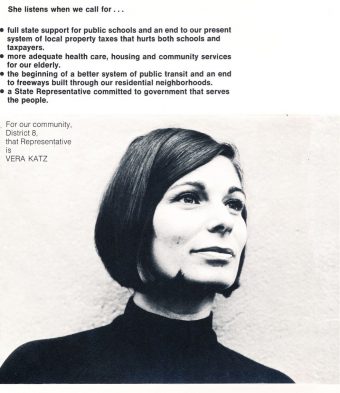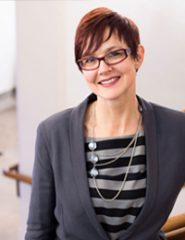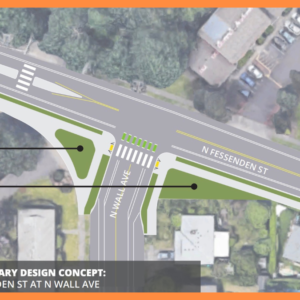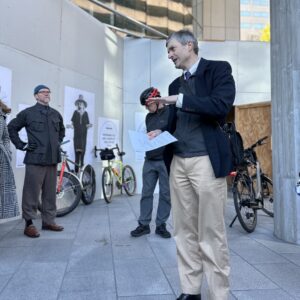
(Portland State University Library Special Collections)
Sarah Iannarone is the associate director of First Stop Portland and a former candidate for Portland Mayor. She lives in east Portland.
Former Portland Mayor Vera Katz died last week at age 84. Three time Speaker of the Oregon House of Representatives who went on to serve three terms as Portland Mayor, Katz’s reach was extensive. Part legacy leaver, part urban legend, Katz’s persona looms as large in Portland’s civic imagination as her accomplishments.
As someone born the year Katz was first elected and somewhat removed from state and local politics during her tenure, I’m not suited to eulogize her. Rather, I offer a few lessons gleaned from her leadership and thoughts how we might apply them today.
When I arrived in Portland in 1998 — one of those twenty-somethings allegedly looking to retire — Katz was just beginning her second term as Portland mayor. I’d rented a one-bedroom basement apartment in the Historic Alphabet District for $500 (remember those?) and my living room windows looked directly onto the front stoop of Katz’s 1890 Victorian. At the crack of dawn on workdays (which included many Saturdays and even some Sundays), her distinctive voice would ring across the yard with a warm greeting to her driver followed by a quickly barked roadmap of the morning’s activities. She wouldn’t get home until usually well after dark. I didn’t know then why my neighbor with the New York accent had no time for small talk on that stoop; I knew only that she seemed important and powerful, a bit of workaholic even, and that she never drove herself anywhere.
Ten years later, I found myself her neighbor again. This time, I knew who she was. Having wrapped up her last term as Portland Mayor, Katz occupied an office part-time at Portland State University as a Visiting Fellow in the Institute of Portland Metropolitan Studies alongside College of Urban & Public Affairs Dean Nohad Toulan. I was just beginning my tenure down the hall from her there with the First Stop Portland program, where I’d been assigned the task of assembling Portland’s sustainability story and building a “green brain trust” of local experts to share their firsthand experiences with policymakers from around the globe. A good chunk of my work entailed translating step-by-step how Katz & Co. had transformed Portland from a parochial backwater into a sustainability mecca now famous for its climate action planning, downtown redevelopment, investments in transit and cycling, and culture of citizen engagement. In the decade since, hundreds of mayors and their emissaries have traveled from around the world to study Portland as a “model city.”
Katz oversaw Portland through the 1990s and into the aughts, a period of sustained growth and prosperity. She was instrumental in many landmark projects, notably revitalizing the Pearl and South Waterfront districts and connecting them by streetcar and aerial tram. She oversaw bicycling and walking investments including Portland’s “Yellow Bike” share program and construction of her eponymous Eastbank Esplanade. Even the new Tilikum Crossing, coming online long after her time, bears her imprint. By one project designer’s account, original designs had the towers much taller than built: it was Katz who’d insisted on scaling them down lest our moderately-scaled city risk “ostentation.”
“For better or worse, Katz was an orthodox urbanist who believed that good design was a pathway to livability for the average Portlander.”
For better or worse, Katz was an orthodox urbanist who believed that good design was a pathway to livability for the average Portlander.
Which brings us to Lesson #1: Urbanism is a practice not a vision. People talk about how visionary Katz was but I’d argue her ideas about what would make Portland livable were informed less by Utopian ideals of the great city and more by her experiences growing up on the streets of Brooklyn. Like Jane Jacobs, who also spent many formative years in mid-century NYC, Katz was intimately familiar with dense, walkable neighborhoods connected by mass transit and understood the dynamics by which human-scale design fostered community. Rather than maintaining some fixed image of what Portland might look like twenty years down the road, it’s likely Katz had internalized the relationship between urban form and urban life and the importance of infrastructure to connect them. It was from a practical position then, not an idealistic one, that she midwifed Portland’s first high-density urban neighborhoods to accommodate the demographic shifts she astutely predicted would shape the city’s future. Katz once proposed capping of I-405 for development and was vocally opposed to urban freeway expansion.
If Katz were mayor today, she’d likely talk less about building lanes on I-5 at the Rose Quarter than about building high-density housing in inner eastside neighborhoods from OMSI to Albina, connected by the Esplanade and streetcar. Katz knew quality of life in a city was directly related to the quality of its neighborhoods.
Advertisement
At a celebration of life this week for Doug Macy, a pioneering designer who was also influential in shaping Portland, one of his eulogizers shared that he was fond of Daniel Burnham’s quote, “Make no little plans; they have no magic to stir men’s blood.” Even if Katz wasn’t familiar with this quote, she certainly lived it, which leads us to Lesson #2: Leadership requires chutzpah. When people talk about Katz’s style, they describe her moxie, brazenness, and assertiveness.
“Collaboration is where Katz’s leadership really shines… she cared less about asserting ‘power over’ and more about building ‘power to.’
On the week of her passing, we repeatedly saw words like “force of nature” “indomitable” “tenacious” “tireless” and “bold.” A long-time champion of gay and women’s rights, Katz’s passionate activism was the precursor to her entering politics, according to her son, Jesse. As legislator and then mayor, Katz’s chutzpah meant she swung for the fences — understanding all too well that thinking big and taking risks sometimes meant striking out. Katz suffered losses — such as failing to bring Major League Baseball to Portland or reforming the commission form of government — but she was rarely defeated. Given the current pace of Portland’s growth and increasing uncertainty from D.C., Portland’s leaders at all levels would be well served to emulate Katz’s chutzpah — taking more risks, failing with grace, and committing to big, bold ideas rather than equivocating in the name of consensus building.
Speaking of bringing people together to get things done, collaboration is where Katz’s leadership really shines. I read several times last week that Katz was intentional about the “feminization” of her politics — she cared less about asserting ‘power over’ and more about building ‘power to.’ It’s not coincidental that Portland’s last multiple-term and arguably “last successful” mayor approached the job less as a manager or executive than as an activist and mother. Which points us directly toward Lesson #3: Lead like a mother.
There’s been a lot of talk among Portland’s leadership lately about cross-sector and intergovernmental collaboration to address some of Portland’s more pressing problems, including our housing crisis. Make no mistake, Katz was masterful at creating effective partnerships. But Katz knew, as all mothers do, that consensus can be overrated — ask anyone who’s thrown a toddler birthday party how much consensus matters to a successful outcome. Mothers also know that conflict is a part of daily life; rather than working to avoid it, mothers spend their time filtering it, shaping it, and directing it to get everyone where they need to go. Whether instinctual or learned (likely a combination of both) Katz recognized that leadership doesn’t end once everyone’s around the table and she was rarely preoccupied with arriving at consensus. She demonstrated that for politicians to lead effectively, they needed to stir emotion in their community, to shape the collective impulse that would move them in the same direction toward a common goal. Good leadership, Katz taught us, inspires bold vision; it doesn’t stem from it.
Which brings us to that inevitable paradox wherein our successes create new challenges. Katz’s greatest contributions to our city, the investments in compact, walkable neighborhoods connected by transit that she championed to improve the lives of average Portlanders, have ultimately priced many of them out. The 400 square-foot apartment I once occupied on NW Johnson now rents for $1500 a month; that Victorian next door would sell for around $1.3 million. Many Katz fans probably bristled as the Washington Post assigned her responsibility for turning “Portland into a hipster haven” — feeling it was callously ‘too soon’ but also knowing, to some extent, that it’s true. Furthermore, Katz’s brand of downtown-centric urbanism meant that while livability (and property values) increased for many Portlanders, those outside the tidy grid of the central city were largely left out of the equation. Despite adding significant housing units in her time, no one benefitted on Katz’s watch as much as real estate developers, who experienced a windfall from the global forces transforming urban industrial space for the emerging knowledge economy alongside a pro-growth mayor with a proclivity for PPPs (public-private partnerships). One East Portlander recalled Katz cutting budgets to services in his neighborhood while downtown was redeveloped under intense public subsidy: “It was the first time I witnessed wealth extraction from the working class to the wealthy.”

Today, the everyday urbanism Katz tirelessly championed on behalf of her beloved Portland has worked well for some residents, but has become a tool of increasing inequity and exclusion for many others.
While Katz is spoken of today with respect verging on reverence, it’s important to remember that she was very much a product of her times. The last mayor to govern Portland prior to the internet era, her decisive yet often contentious action escaped to some extent the incessant scrutiny and popular commentary today’s elected officials face. The increasing inequity, displacement, privatization, and thinning of the social safety net that gained a toehold on Katz’s watch has intensified with every mayor since and is bifurcating cities worldwide, including Katz’s hometown of Brooklyn, which finds itself reeling from gentrification of a magnitude that Portlanders can barely imagine.
These prevailing patterns of urban development are global; no cities are immune. So how can these place-based lessons in leadership from the Katz era remain relevant in a rapidly globalizing Portland? As our city, like so many others, finds itself increasingly divided, we must shift Katz’s focus on quality of life away from the project of urban development toward tackling injustice in our city. We must apply an equity lens relentlessly to Katz’s everyday urbanism, recentering our neighborhood investments away from urban design and toward human rights. We must channel Katz’s chutzpah and courage as we make hard, sometimes unpopular decisions around redistribution of wealth and power in our city and region. Finally, we must continue her legacy of feminizing our local politics, dismantling oppressive power structures and innovating diverse and inclusive institutions to help us adapt sustainably and prosperously for our common future.
(CORRECTION: This post originally stated that Doug Macy was fond of Goethe’s quote, “Dream no small dreams for they stir not hearts of men.” We got that wrong. The quote mentioned at his eulogy was Daniel Burnham’s, “Make no little plans; they have no magic to stir men’s blood.” We regret the error.)
— Sarah Iannarone, @SarahforPDX
Never miss a story. Sign-up for the daily BP Headlines email.
BikePortland needs your support.







Thanks for reading.
BikePortland has served this community with independent community journalism since 2005. We rely on subscriptions from readers like you to survive. Your financial support is vital in keeping this valuable resource alive and well.
Please subscribe today to strengthen and expand our work.
Very well put. This articulates what I feel has been missing from Portland leadership. I think Sam Adams had it, but Hales did not. I thought Wheeler might bring some of this type of leadership, but so far I have been disappointed. This was a pleasure to read, thanks!
Adams was a disaster – both in terms of leadership and in character. His checkered job path since is more evidence of that. He benefited greatly from the coattails of Katz.
Excellent post! Thank you for sharing your thoughts. I agree with maxD…I had hopes for Wheeler following on the heels of useless Hales, but I really wish we had you in there. I hope you will continue to make your own voice heard and seek another chance at a leadership role in service to Portland.
Fine essay, Sarah.
The New York Times had a long obituary for Vera last Thursday.
Don’t blame me, Portland, I voted for Sarah.
Thanks Sarah! Great article! I hadn’t realized she pushed for reform of the commission form of government. I hope we can see more female city leaders emerge, especially those in favor of transforming our streets to be safe and efficient for more people.
She was a sharp cookie, that one https://multco.us/elections/may-21-2002-measure-no-26-30
Sarah, thank you for this article. You are right on point about leadership and consensus. When I moved to Portland I had already heard so much about its success in progressive urbanism and bicycling. But I could not identify any elected official from the last and the current administration who we can consider as a champion for urbanism or has a progressive housing and transportation agenda (Novick was probably the closest).
Portland is no longer the second tier provincial city. As we grow in size and wealth we are experiencing the same issues as many top tier cities in the US. This demands bolder action and vision. But our elected officials and agency leaders seem unable to put forth any effective policy that other world class cities have done to address dire housing and transportation needs. PBOT holds multiple neighborhood open house meetings just because a handful neighbors don’t like diverters. BPS went through a year long uphill battle and many public meetings on residential infill because of a minority opinion on the RIPSAC. Progress seems can only be made by tip-toeing slowly forward. The vision for creating dense, walkable, and transit oriented neighborhoods is now synonymous as destroying neighborhood character. The absence of urbanist leadership and the unproductive obsession on consensus has enabled neighborhood parochialism to defeat any collective solution for reducing inequity in housing and transportation.
Speaking of “the unproductive obsession on consensus,” I would just add that what many Portland leaders seem to strive for nowadays is a kind of fake consensus which is based on fake hearing (“You had your say,” as I once heard Kitzhaber say). We need leaders who are strong enough to say, “We heard your dissenting opinion but we’re going to go in another direction and this is why” – and then have a strong case. I never knew Vera Katz but I’ll bet she could do that sort of thing. Many people have been turned off or felt burned by the so-called Portland process, in which people are asked to give input but then aren’t actually heard. Consensus-building in itself is not a bad thing – in fact, it’s essential but it has to be done right.
Vera was a big person and no doubt she could take a joke. Would her resumé have been complete without the yellowbikes?
What a nice remembrance, Sarah! Mayor Katz was a fine human being and a great, visionary leader. I always blow her a kiss when I ride past her sculpture on the Esplanade. 🙂
A very nice tribute. Thank you for writing it. I learned a lot and was inspired.
Many Katz fans probably bristled as the Washington Post assigned her responsibility for turning “Portland into a hipster haven” — feeling it was callously ‘too soon’ but also knowing, to some extent, that it’s true.
Curious to me that we still struggle to identify growth (in everything) as the problem that it is. We seem incapable of imagining our society without it while at the same time everything we (presumably) hold dear is threatened by it. If that isn’t a form of madness I don’t know what is.
I have other opinions, but since this seems to be a love-fest I will attempt to keep them to myself.
departing words from Portland’s mayor (CH)
“It’s definitely possible that we have too many white men looking like lumberjacks drinking coffee and riding their bicycles and the rainbow Portland that some people think is here may not exist.” I know that might not be a very political answer but I am gone in two weeks, not planning on running for office ever again.”